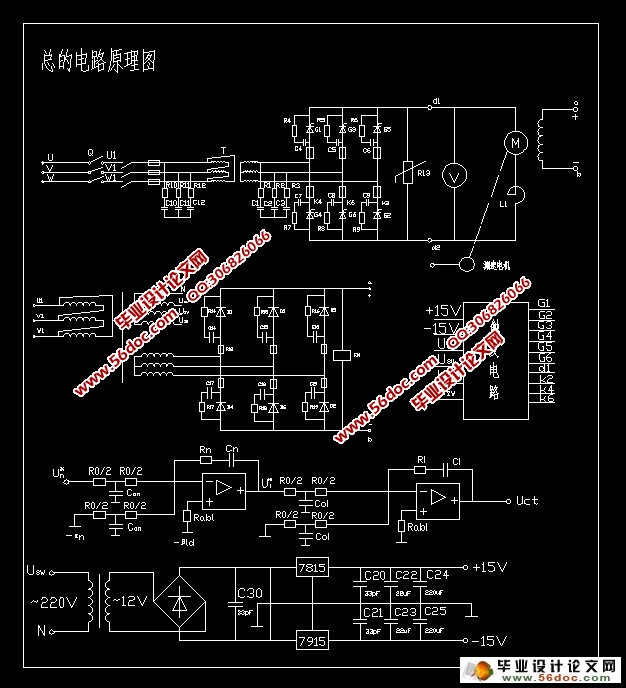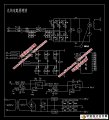基于MATLAB的直流电机双闭环调速系统设计(电路原理图)(任务书,开题报告,中期检查表,论文说明书23000字,CAD图1张)
摘 要
直流电机双闭环调速系统是一个复杂的自动控制系统,是目前直流调速系统中的主流设备,具有调速范围宽、平稳性好、稳速精度高等优点,在理论和实践方面都是比较成熟的系统,在拖动领域中发挥着极其重要的作用。
由于直流电机双闭环调速是各种电机调速系统的基础,本文从直流电机的基本特性进行双闭环直流电机设计,最后用实际系统进行工程设计,并采用MATLAB/SIMULINK进行仿真。
对于直流电机双闭环调速系统,在设计和调试过程中有大量的参数需要计算和调整,运用传统的设计方法工作量大,系统调试困难。本文对直流电机双闭环调速系统进行辅助设计,选择调节器结构,进行参数计算和近似校验,根据给出和计算出的相应参数,建立起制动、抗电网电压扰动和抗负载扰动的MATLAB/SIMULINK仿真模型,分析转速和电流的仿真波形,并进行调试,使直流电机双闭环调速系统趋于完善、合理。仿真结果证明了该方法的可行性和合理性。
关键词:直流调速,双闭环系统,电流调节器,转速调节器,计算机仿真
Abstract
The double closed loop direct current velocity modulation system is a complex automatic control system, is in the present direct current velocity modulation system mainstream equipment, has the velocity modulation scope width, the stability is good, the steady fast precision higher merit, in the theory and the practice aspect all is the quite mature system, in drives in the domain to play the extremely vital role.
Because the direct current machine double closed loop velocity modulation is each kind of electrical machinery velocity modulation system foundation, from the direct current machine basic characteristic conducts the double closed loop direct current machine design method research, finally uses the actual system to carry on the engineering design, and uses MATLAB/Simulink to carry on the simulation.
Regarding the double closed loop direct current velocity modulation system, has the massive parameters in the design and the debugging process to need to calculate and to adjust, the utilization tradition design method work load is big, system debugging difficulty. This article carries on the assistance design to the double closed loop direct current velocity modulation system, chooses the regulator structure, carries on the parameter computation and the approximate verification, according to produces the corresponding parameter which and calculates, establishes applies the brake, the anti- electrical network voltage perturbation and the anti-load perturbation MATLAB/Simulink simulation model, the analysis rotational speed and the electric current simulation profile, and carries on the debugging, enable the double closed loop direct current velocity modulation system to tend to the consummation, is reasonable. The simulation result has proven this method feasibility and the rationality.
Keywords: Speed control of DC-drivers,Double-closed-loop,Current regulator,Speed regulator,Computer simulation
论文的主要内容
此次设计是以直流电动机为对象,用工程设计方法设计直流电动机双闭环调速系统,基于直流电动机的基本方程给出动态结构图,建立双闭环调速系统的数学模型,并应用MATLAB进行仿真,对仿真结果进行分析和研究,验证控制方案的合理性。
主要完成如下工作:
(1) 数学模型的建立
认真学习相关资料,根据直流电动机基本方程,建立双闭环调速系统的数学模型并给出动态结构框图。
(2) 系统方案设计
通过国内外中英文资料介绍,了解直流电动机双闭环调速系统的最佳工程设计方法,并进行调速系统的设计。
(3) 仿真的进行和结果的分析与探究
深入学习和掌握MATLAB下的Simulink系统模型的搭建方法,进行模型搭建和仿真,对结果进行分析与探究。

目 录
摘 要 I
Abstract II
目 录 III
1. 绪 论 1
1.1 课题背景 1
1.2 课题研究的目的和意义 1
1.3 论文的主要内容 2
2. 直流电动机调速系统 4
2.1 直流电动机简介 4
2.1.1 直流电动机的工作原理 4
2.1.2 直流电动机的运行特性 5
2.1.3 直流电动机的起动与调速 6
2.2 转速控制的要求和调速指标 7
3. 方案选择及系统工作原理 9
3.1 电动机参数及设计要求 9
3.2 方案选择及系统框图 9
3.2.1 方案一:直流电机单闭环调速系统 9
3.2.2 方案二:直流电机双闭环调速系统 10
3.2.3 方案三:双闭环脉宽调速系统 11
3.3 系统工作原理简介 11
3.3.1 双闭环调速系统静态特性 11
3.3.2 双闭环系统启动过程分析 14
3.3.3 双闭环调速系统的动态抗扰动性能 17
3.3.4 双闭环调速系统中两个调节器的作用 18
4. 双闭环调速系统的设计 19
4.1 双闭环直流调速系统总体设计方案 19
4.2 主电路设计与参数计算 20
4.2.1 主电路原理图 20
4.2.2 整流变压器的设计 21
4.2.3 晶闸管元件选择 23
4.2.4 电抗器参数的计算 24
4.2.5 励磁电路 26
4.2.6 三相桥式全控整流电路 26
4.2.7 晶闸管触发电路 28
4.3 直流调速系统的保护 30
4.3.1 过电压保护 30
4.3.2 电流保护 33
4.4 控制电路设计 34
4.4.1 电流调节器的设计 35
4.4.2 转速调节器的设计 37
5. 调速系统的仿真 40
5.1.1 MATLAB简介 40
5.1.2 MATLAB的安装 41
5.1.3 MATLAB的启动运行 41
5.1.4 MATLAB的帮助文件 41
5.1.5 MATLAB所定义的特殊变量及其意义 41
5.1.6 MATLAB工具箱及SIMULINK简介 42
5.2 调速系统仿真模型的建立 43
5.3 仿真结果 43
5.4 仿真结果分析 46
结 论 47
参考文献 48
致 谢 49
附 录 A 50
|



